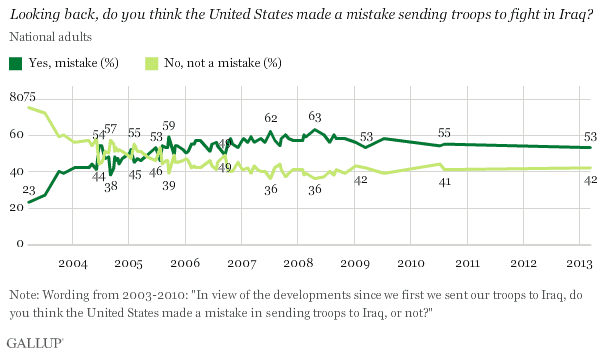By Glynn Wilson –
It has been 10 years since the Bush-Cheney administration made the decision to invade Iraq, and according to public opinion research, a majority of Americans consider this a regrettable anniversary.
According to the latest Gallup poll on the subject, 53 percent of Americans believe their country “made a mistake sending troops to fight in Iraq.”
This marks the first time Gallup has asked this question since the full withdrawal of American troops in December 2011. Although majorities or near-majorities have viewed the conflict as a mistake continuously since August 2005, the current 53 percent is down from the high point of 63 percent in April 2008 during the presidential campaign.
“This week marks the 10th anniversary of the beginning of the Iraq war. Though the engagement has now come to an end, this seminal event in recent American history still looms large in the national political consciousness,” Gallup says in its analysis of the data.
In his second inaugural address, President Barack Obama highlighted the end of the war, saying “a decade of war is now ending.” More recently, Sen. John McCain confronted now-Secretary of Defense Chuck Hagel as to whether the 2007 Iraq war “surge” was successful.
To mark the occasion, President Barack Obama and first lady Michelle Obama paid tribute to American troops.
“We salute the courage and resolve of more than 1.5 million service members and civilians who during multiple tours wrote one of the most extraordinary chapters in military service. We honor the memory of the nearly 4,500 Americans who made the ultimate sacrifice to give the Iraqi people an opportunity to forge their own future after many years of hardship,” the president said in a prepared statement. “And we express our gratitude to our extraordinary military families who sacrificed on the home front, especially our Gold Star families who remain in our prayers.”
The president pointed out that the last U.S. troops left Iraq “with their heads held high” in 2011.
“The United States continues to work with our Iraqi partners to advance our shared interest in security and peace,” he said. “Here at home, our obligations to those who served endure.”
He said we must ensure that the more than 30,000 Americans wounded in Iraq receive the care and benefits they deserve and that we continue to improve treatment for traumatic brain injury and post-traumatic stress disorder.
“With a strong Post 9/11 GI Bill, we must help our newest veterans pursue their education and find jobs worthy of their incredible talents,” the president said. “And all Americans can continue to support and honor our military families who are pillars of so many of our communities. On this solemn anniversary, we draw strength and inspiration from these American patriots who exemplify the values of courage, selflessness and teamwork that define our Armed Forces and keep our nation great.”
Analysis of Public Opinion and Reality
Americans initially supported the war in Iraq, as did the mainstream media in America, with substantial majorities in 2003 saying the U.S. decision to get involved in Iraq was not a mistake. But after it was learned that there were no weapons of mass destruction found in Iraq, and no evidence such a program existed — and no connection between Saddam Hussein and al Qaeda and the attacks on the U.S. on 9/11 — attitudes changed quickly. By the summer of 2004, a majority of Americans called the war a mistake.
“Opinions fluctuated somewhat thereafter but, with one exception, since August 2005, a majority has said the war was a mistake each time Gallup has asked the question.” At several points in time, more than 60 percent said so. The last time Gallup asked this question, in August 2010, 55 percent called the war a mistake.
A majority of Americans also view Vietnam, another major U.S. military engagement of the modern era, as a mistake. The same March survey finds 57 percent of Americans saying the Vietnam War — which resulted in the most U.S. casualties of the three recent wars — was a mistake. But that is down from 69 percent in November 2000.
On the other hand, a slim majority of Americans (51 percent) say the war in Afghanistan — a military engagement still in progress, albeit with a scheduled withdrawal date — was not a mistake. Still, 44 percent believe sending troops to Afghanistan was a mistake — the highest on record.
Republicans Still Stand Behind Iraq War
“Wars often spur times of immense national unity — moments in which partisan politics dissipate and dissent is muted,” according to Gallup. “This effect is famously temporary, and with respect to the Iraq war, it is clear that attitudes on whether it was a mistake break heavily along partisan lines, despite nearly unanimous initial support.”
Not surprisingly, given that the war was begun in the administration of a Republican, former President George W. Bush, 66 percent of respondents who identify as or lean Republican say the U.S. did not make a mistake in sending troops to fight in Iraq, while 30 percent express the contrary view.
In contrast, 73 percent of Democratic leaners or identifiers see the military campaign as a mistake. Only 22 percent in that group say it was not a mistake.
“Recent wars have been much more polarizing than past conflicts such as World War II, which enjoyed strong bipartisan support when Gallup last inquired on the matter in 2004,” according to Gallup.
Republicans and Republican leaners say the Afghanistan invasion was not a mistake by more than a 2-1 margin — 66 percent vs. 31 percent. Democrats’ and Democratic leaners’ views are the opposite: 56 percent think it was a mistake to send troops to Afghanistan, while 40 percent say it was not.
Republicans and leaners are more evenly divided on the Vietnam War — the only war of the three recent ones that was initiated under a Democratic president — with 46 percent saying it was a mistake and 45 percent saying it was not. Democrats again lean heavily toward the “mistake” column, by 69 percent to 23 percent.
Generational Divide Clear on Recent Wars
Older Americans are more likely than younger ones to say the wars in Iraq, Afghanistan and Vietnam were a mistake.
Nearly six in 10 Americans aged 65 or older and 57 percent of those aged 50 to 64 say it was a mistake to send troops to Iraq, compared with 50 percent each of 18- to 29-year-olds and 30- to 49-year-olds. Majorities of those aged 65 or older — who over their lifetimes have seen various U.S. military operations — see all three wars (Iraq, Afghanistan, and Vietnam) as a mistake, the only age group to do so.
Young adults are the only age group in which a majority says the Vietnam War was not a mistake (51 percent) — “perhaps because they have no personal memory of the conflict,” according to Gallup.
Implications
On the 10th anniversary of the Iraq war, most Americans judge the conflict “a mistake.”
“While Americans long ago soured on the military decision, recent opinion has changed little, now that U.S. troops have been completely withdrawn from the country for more than a year,” according to Gallup.
The national consensus is decidedly against the Iraq war, as well as the more distant Vietnam War.
Even the war in Afghanistan, launched shortly after the horrific 9/11 attacks and which President Obama once referred to as the “good war,” has sizable opposition.
“The unpopularity of these wars has led some political commentators to warn of a new ‘American isolationism,’ which limits or curtails future military action,” according to Gallup. “It is clear that Americans are not of one mind in believing that past military conflicts were the right course of action and, as such, may be more cautious about supporting future actions.”
Survey Methods
Results for this Gallup poll are based on telephone interviews conducted March 7-10, 2013, on the Gallup Daily tracking survey, with a random sample of 1,022 adults, aged 18 and older, living in all 50 U.S. states and the District of Columbia. For results based on the total sample of national adults, one can say with 95 percent confidence that the margin of sampling error is plus or minus 4 percentage points.














